

Sustainable economics. New Zealand ranked first in the world for social and environmental progress. New Zealand has come first in a global index that ranks countries by social and environmental performance rather than economic output in a drive to make social progress a priority for politicians and businesses.
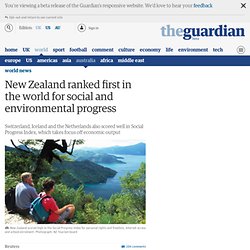
The Social Progress Index (SPI), published on Thursday, rates 132 countries on more than 50 indicators, including health, sanitation, shelter, personal safety, access to information, sustainability, tolerance and inclusion and access to education. It asks questions such as whether a country can satisfy its people's basic needs and whether it has the infrastructure and capacity to allow its citizens to improve the quality of their lives and reach their full potential. "The index shows that economic growth does not automatically lead to social progress," Michael Green, executive director of the Social Progress Imperative, a non-profit organisation that publishes the index, said. New Zealand received high scores for personal rights and freedom, internet access and school enrolment.
Chapter II - The circular model’s founding principles. The closed loop model is a biomimetic (life-imitating) approach, a school of thought that takes nature as an example and considers that our systems should work like organisms, processing nutrients that can be fed back into the cycle – hence the “closed loop” or “regenerative” terms usually associated with it. © Richard Crookes It relies on five founding principles Waste is food Eliminate waste.
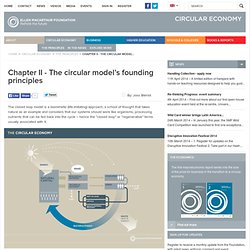
The biological and technical component parts (nutrients) of any product should be designed for disassembly and re-purposing. The biological parts are non-toxic and can be simply composted. Diversity is strength Diverse systems, with many connections and scales are more resilient in the face of external shocks, than systems built just for efficiency – it applies to economies and communities too. To make this happen… Energy must come from renewable sources As in life, any system should ultimately aim to run on ‘current sunshine’ and generate energy through renewable sources. Download as PDF. Gold-Standard #SustyGoals: A Dialogue with Bob Willard. The Ordnance Survey benchmark symbol | Image credit: Chalto/Flickr At the third annual Sustainable Brands #NewMetrics Conference at the University of Pennsylvania in September, the need for next-generation sustainability goals — which measure progress toward real-world goal-lines such as carbon budgets, water tables, and living wages — emerged as a key theme.
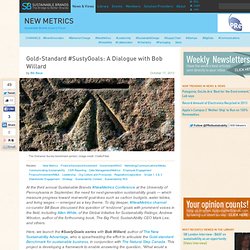
To dig deeper, #NewMetrics channel co-curator Bill Baue discussed this question of “endzone” goals with prominent voices in the field, including Allen White, of the Global Initiative for Sustainability Ratings; Andrew Winston, author of the forthcoming book, The Big Pivot; SustainAbility CEO Mark Lee, and others. The Social Dimension of Strategic Sustainable Development (Licentiate by Merlina Missimer) - Electronic Research Archive @ Blekinge Institute of Technology (BTH) Sustainable development most prominently entered the global political arena in 1987 in a report from the United Nations Commission on Environment and Development, also known as the Brundtland report.
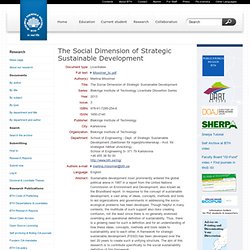
In response to the concept of sustainable development, a vast array of ideas, concepts, methods and tools to aid organizations and governments in addressing the socio-ecological problems has been developed. Though helpful in many contexts, the multitude of such support also risks creating confusion, not the least since there is no generally endorsed overriding and operational definition of sustainability. Thus, there is a growing need for such a definition and for an understanding of how these ideas, concepts, methods and tools relate to sustainability and to each other. A framework for strategic sustainable development (FSSD) has been developed over the last 20 years to create such a unifying structure. Analyzing the Concept of Planetary Boundaries from a Strategic Sustainability Perspective: How Does Humanity Avoid Tipping the Planet?
Copyright © 2013 by the author(s).
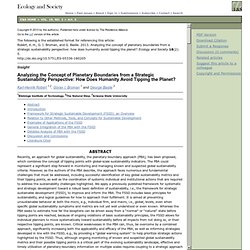
Published here under license by The Resilience Alliance. Go to the pdf version of this article The following is the established format for referencing this article: Robèrt, K. -H., G. I. Insight 1Blekinge Institute of Technology, 2The Natural Step, 3Arizona State University Recently, an approach for global sustainability, the planetary-boundary approach (PBA), has been proposed, which combines the concept of tipping points with global-scale sustainability indicators.
Key words: framework for strategic sustainable development; planetary boundaries; planning; strategy; sustainability; tipping points. Millennium Development Goals. Socio-ecological indicators for sustainability. Safe and Just Space for Humanity. Can we live inside the doughnut? Why the world needs planetary and social boundaries. This blog summaries a new Discussion Paper published by Oxfam.
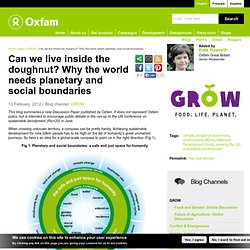
It does not represent Oxfam policy, but is intended to encourage public debate in the run-up to the UN conference on sustainable devolpment (Rio+20) in June. When crossing unknown territory, a compass can be pretty handy. Achieving sustainable development for nine billion people has to be high on the list of humanity’s great uncharted journeys. So here’s an idea for a global-scale compass to point us in the right direction (Fig 1).
Fig 1. Source: Oxfam, inspired by Rockström et al (2009) What’s going on here? Putting excessive stress on these critical processes could lead to tipping points of abrupt and irreversible environmental change, so Rockström et al proposed a set of boundaries for avoiding those danger zones. Brundtland Report 1987. Tim Jackson: Prosperity Without Growth. The Four System Conditions of a Sustainable Society. Planetary Boundaries : Specials.